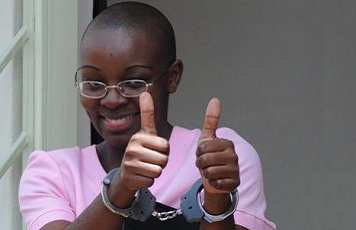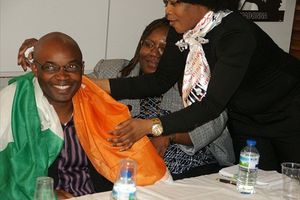Victoire Ingabire Umuhoza Democracy and Peace Prize Awarded to Charles Onana and Phil Taylor

The 2018 Victoire Ingabire Umuhoza Democracy and Peace Prize was awarded on Saturday, 03.10.2018, in Brussels, Belgium. The prize honors Rwandan political prisoner Victoire Ingabire Umuhoza. Despite the African Court of Human and People’s Rights’ 2017 ruling that her imprisonment is unjust and that Rwanda should free her, she remains behind bars.
Charles Onana and Phil Taylor
This year’s Victoire Prize went to Cameroonian French journalist Charles Onana and Canadian radio broadcaster Phil Taylor. Onana is the author of many books including The Secrets of International Justice, Secrets of the Rwandan Genocide, and The Tutsi Killers at the Heart of the Congolese Tragedy. None of Onana’s books have been translated from French to English, and his life has been threatened for challenging historical orthodoxy about Rwanda and the Democratic Republic of Congo.
Phil Taylor is the host of The Taylor Report on CIUT 89.5 FM at the University of Toronto. He was an investigator for defense attorneys at the International Criminal Tribunal on Rwanda, where they challenged the court’s a priori assumptions about what had actually happened in Rwanda in 1994. For many years his CIUT-Taylor Report was the only North American broadcast outlet giving voice to dissident Rwandans and ICTR defense attorneys. His Taylor Report website offered the only English translation of Robin Philpot’s book, Rwanda 1994: Colonialism Dies Hard, until the book was updated and finally published in English in 2013 as Rwanda and the New Scramble for Africa: From Tragedy to Useful Imperial Fiction.
Victoire

Charles Onana
Victoire left her family, her professional achievements, and her comfortable life in the Netherlands to return home to Rwanda and attempt to stand against President Paul Kagame for the presidency in January 2010. She knew that she was likely to be assassinated or imprisoned, and she was imprisoned seven months later. She had said that she was going home because she couldn’t bear to see her people continuing to suffer under Kagame’s regime, and by that she meant her Rwandan people. Her former lawyer, Iain Edwards, said that it was a joy to represent her and that “She loves her Rwandan people. She makes no distinction whatsoever between Hutu, Tutsi, or Twa.”
Since most Americans find her African names challenging to pronounce or remember, I ask them to simply call her “Victoire,” as her supporters do.
Victoire’s own dissident voice can be heard, in Kinyarwanda, in The Song for Madame Victoire Ingabire on SoundCloud:
Let me tell all Rwandans that what we wish for is that all of us work together to make sure that such a tragedy will never take place again. That is one of the reasons why the political party FDU made a decision to return to the country peacefully, without resorting to violence, though many people think that the solution to Rwanda’s problems is to resort to armed struggle. We do not believe that shedding blood should resolve problems. When people shed blood, the blood comes back to haunt them.
For all of us to reach reconciliation, we need to empathize with everyone’s sadness. For the Tutsis who were killed, those Hutus who killed them must be punished. For the Hutus who were killed, those who killed them must be punished as well. Furthermore, it is important that all of us, Rwandans of different ethnicities, understand that we need to unite, respect each other, and build our country in peace.
Victoire’s Challenge to Historical Orthodoxy
Upon her return to Rwanda in January 2010, Victoire went to Kigali’s genocide memorial museum and, surrounded by press, asked, “Where is the memorial for the Hutus who died?” She was soon placed under house arrest and ordered not to speak to the press, but that didn’t stop her. Despite the court’s order and her confinement to the city of Kigali, she spoke to any press who dared speak to her—meaning mostly foreigners, like myself, who called her on the phone. At least one Rwandan journalist was murdered that year, and more fled to neighboring Uganda and beyond. Speaking to Victoire as journalists would have been like signing their own death warrants.
Victoire clearly stated that neither she nor her party have ever denied the Tutsi genocide, but the world should understand that before, during, and after the Tutsi genocide, Hutu people were killed, and those who killed them must also be charged and prosecuted. She said that for the nation to heal, Rwandans who had lost loved ones, Hutu, Tutsi, and Twa, must all be allowed to openly mourn their dead.
The orthodox, Manichean oversimplification of the Rwandan Genocide is that the majority Hutu government executed a long-planned genocide by arming and enabling extremist Hutus who massacred between 500,000 and 1,000,000 Tutsi civilians in 100 days, between April 7 and July 4, 1994. It is fiercely defended by Wikipedia editors, and by President Kagame’s minions in Western academia and media. It became Kagame’s excuse for invading, occupying, and plundering Rwanda’s neighbor, the Democratic Republic of the Congo; every time his troops have crossed the border since 1996, he has said they’re hunting down Hutu genocidaires who had fled to Congo.
The orthodox account is also written into official documents and polemics to justify so-called “humanitarian intervention” by the US to “stop the next Rwanda.” These include Mass Atrocities Response Operations: A Military Planning Handbook produced by the Pentagon and Harvard’s Carr Center, with financial support from tech billionaire Pierre Omidyar’s “Humanity United” foundation. Since the Pentagon is never underfunded and currently has more money than it can figure out how to spend, it seems safe to say that Omidyar’s contribution had more to do with putting his “Humanity United” stamp on the handbook than with any need for money.
So Victoire Ingabire is not only up against Rwandan President Paul Kagame, who had her locked up and sentenced to 15 years. She is also up against the ideological infrastructure of humanitarian intervention. If the Western powers were to revise their good Tutsi-evil Hutu “Hotel Rwanda” account of what happened in 1994, or to acknowledge that President Kagame commands those whom Charles Onana identifies as The Tutsi Killers at the Heart of the Congolese Tragedy, they would have to rewrite their humanitarian war handbook and more.
Victoire no doubt knew the enormity of what she was challenging beyond Rwanda’s own borders, but she didn’t take it upon herself to criticize the US. I once asked her whether she wanted to say anything about US involvement in the Rwandan and Congolese tragedies on Pacifica airwaves. Her answer was the briefest, “No,” but her meaning was clear. She was risking her life to challenge the Kagame regime, and any challenge to our own government was up to us.
A good starting point is reexamining the account of the Rwandan massacres that we’ve all been asked to believe as though it were inscribed on the stone tablets that God reportedly handed down to Moses in the Sinai.
*
Ann Garrison is an independent journalist based in the San Francisco Bay Area. In 2014, she received the Victoire Ingabire Umuhoza Democracy and Peace Prize for her reporting on conflict in the African Great Lakes Region. She can be reached at @AnnGarrison or [email protected].

